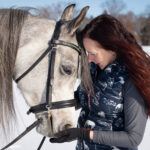There is much controversy over the use of food in the training of horses. Some people use food for everything. Others refuse to ever use food.
I have found that like most things involving horses, there are no hard and fast rules. It really depends on the horse and the situation. Food works well in some cases for some horses, not so well for other horses. Some horses are highly food motivated. However caution must be used to ensure that the horse does not become pushy or disrespectful. This can lead to a loss of control and can quickly become dangerous. Some horses simply are more picky eaters and aren’t as motivated by food. These horses may prefer a good scratch or a kind word rather than food as a reward.
There are some cases where food can be useful.
Bonding
Horses spending a large amount of their time eating. This is a great time to bond with your horse because an eating horse is generally a content horse. By spending time with your horse when he is most relaxed, he will begin to associate you with these good feelings and he will learn to trust you and enjoy being around you. It is important to spend time with your horse other than when you are riding him. It is during this time, when you have no particular goal in mind other than to simply enjoy the presence of your horse, that a true relationship is built. I will often stand with my horses while they are grazing or eating their hay. Horses often do this with each other as a way of bonding. Think of it like going out to dinner with a friend or loved one. You get to spend time with that person while sharing in a good meal and the relationship gets strengthened.
Clicker Training
Clicker training is a method of training a horse to perform specific movements using positive reinforcement. The horse is given a cue and when he performs the desired behavior the handler makes a noise with a clicker and then gives the horse a treat. The sound of the clicker helps the horse to quickly identify what the correct behavior was. When done correctly, clicker training can be highly effective in trick training and target training. However caution must be used. When done incorrectly it can lead to horses that are pushy, difficult to handle, disrespectful, and even dangerous. If you are unfamiliar with clicker training, it is important to work with a knowledgeable trainer to help you get started.
To re-direct the horse’s attention
In certain cases food can be used to refocus a horses attention on the handler. I have recently been working with my horse, Maia, who is extremely fearful of any kind of noise when she is in the arena. She will become so fearful that she will switch into instinctive, “run away” mode. When this happens her brain turns off and her instincts take over and it can be very difficult to get her to calm down again. However this horse is also very food motivated. By giving her food during times when she is fearful, I can redirect her attention back to me and keep her from going into panic mode. When a horse is panicking, they are unable to learn anything. By keeping her thinking about what is going on, I have slowly been able to show her that things really aren’t as scary as she once thought.
I have another horse in training with me who is extremely girthy due to previous rough handling and will bite and kick while being saddled. One thing that has greatly helped this horse is to allow him to eat his hay while I am saddling him. This takes his mind off of the saddling process and his fear that he is going to be handled roughly. Having food available makes saddling a more pleasant experience for him and he now tolerates girthing without a problem.
Food, especially when given from the hand, should always be used with a specific purpose in mind. When treats are given indiscriminately it creates spoiled, disrespectful horses. The horse should never be allowed to beg or push you with his nose or body to get you to give him a treat. A horse that invades your space does not respect you as his leader. It is also important to note that you must be careful to ensure that your horse does not become dependent on food. If the only way you can get your horse to behave is to give him treats then you need to reassess your training. Food should always be used in moderation and with care. If you decide to use food in your training, take the time to learn how to do it properly. This will save you from having trouble in the future. When in doubt, get help from a knowledgeable trainer who can work with you and your horse.
To learn more about how to develop a better relationship with your horse, visit our website or blog, where we feature information about classical dressage and liberty training, as well as care and maintenance of the horse!


